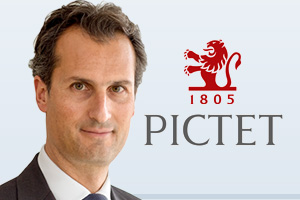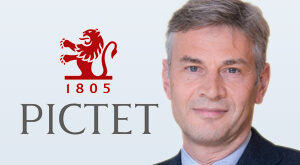
SJB | Korschenbroich, 05.10.2022.
Im August überwogen an den globalen Aktienmärkten die negativen Meldungen, was sich in Kursverlusten des MSCI World bemerkbar machte. Angesichts von Zinsängsten und schwächeren Wachstumszahlen hat der breite weltweite Aktienindex bereits 14 Prozent seines Wertes im Jahresvergleich eingebüsst. Auch die Sektoren Erneuerbare Energien und Umwelttechnologie standen unter Abgabedruck. In diesem angespannten Marktumfeld generierte der Pictet – Global Environmental Opportunities P EUR (WKN A1C3LN, ISIN LU0503631805) eine Wertentwicklung von -3,46 Prozent auf Monatsbasis. Der aktuelle Monatsbericht von Pictet-FondsManager Luciano Diana analysiert für alle Investoren der FondsStrategie SJB Nachhaltig die Veränderungen im Portfolio und liefert einen Ausblick für die Aktienmärkte des Environmental-Sektors.
Market Review
August proved a month of two halves as global equities reversed initial gains to finish firmly in the red. The latest weakness takes year-to-date losses for the MSCI World Index to 14 per cent in local currency terms. Investors initially welcomed signs of a peak in US inflation, but optimism over the possibility of a soft landing for the world’s largest economy faded in the face of weak data – including on jobs – and a hawkish central bank. Fed Chair Jerome Powell said it would “take some time” to restore price stability and the process would ”require a sustained period of below-trend growth”. The S&P 500 finished the month 4 per cent lower. Equity markets in the eurozone, the UK and Switzerland also lost ground. Globally, losses were seen both for small and large-cap stocks as well as for both growth and value styles. Energy was the only sector which managed to post gains despite a steep 12 per cent decline in oil prices. On the environmental front, the major news of the month was the passing of the Inflation Reduction Act (IRA) in the US, which aims at accelerating the energy transition with generous incentives for a total amount of USD 369bn for various environmental technologies such as renewables, energy storage, heat pumps, hydrogen and providing additional support to build up local manufacturing supply chains for these technologies.
Performance analysis
The strategy underperformed the MSCI AC World Index during the month of August. Waste Management & Recycling was the strongest segment, with strong performance across US wastestocks such as Waste Connections, Republic Services and Waste Management because of their better-than-expected quarterlyresults and resilient business performance. Within this segment, European packaging stocks such as SIG Group and SmurfitKappa contributed negatively due to increasing negative investorsentiment on their European business. In Dematerialized Economy, negative contribution came from all portfolio holdings due to increasing interest rates and valuation multiples compression. Within Pollution Control, Thermo Fisher and TetraTech contributed negatively while AECOM outperformed following good results. Renewable Energy stocks detracted due to negative surprises from quarterly results, with underperformance from both SolarEdge and Orsted which reported worse-than expected financial performance. Energy Efficiency was the weakest segment, mainly due to a combination of effects from valuation multiples compression and worse-than-expected quarterly results of certain stocks, such as semiconductor names, including Applied Materials and Tokyo Electron, industrial names, including Schneider and Legrand, as well as building efficiency names including A.O. Smith and Signify.
Portfolio activity – overweightings & underweightings
During the month, we slightly increased our exposure to Dematerialized Economy and Pollution Control and reduced our cash levels. Following encouraging quarterly results in terms of demand resilience and pricing power, we added back to Dassault Systemes and also added back to Ansys, PTC and Autodesk as the stocks remain heavily de-rated. Within Pollution Control, we added to AECOM due to attractive valuations. Within Energy Efficiency, we took some profits in Onsemi following good performance YTD and reduced our positions in Johnson Controls and Applied Materials. Within Renewable Energy, we reduced our positions in SolarEdge and Orsted post their worse-than-expected quarterly results.
Market outlook
The outlook for the environmental theme remains promising. While our portfolio holdings will not be completely insulated from inflationary pressures, they have sufficient pricing power to navigate well in an inflationary environment. The current dislocations in the energy markets put the spotlight on the pace and affordability of the energy transition, stimulating renewable energy investments as well as corporate investments in energy saving technologies. We expect a healthy demand for industrial efficiency solutions, provided that spiralling energy prices do not lead into a recessionary environment. We see a robust semiconductor demand cycle, driven by automotive electrification and industrial automation solutions. We see a steady demand for building automation technologies. We expect the electrification and the digitization of the economy to continue to gain momentum, supporting demand for digital product life cycle management (PLM), design and engineering software and industrial IoT. Within renewables, we prefer exposure to solar over wind as solar energy is less impacted by short-term logistics challenges, component shortages and raw material price increases. We see very robust end-market demand for environmental remediation and climate resilience in the US, bolstered by public infrastructure investments.
Portfolio strategy
Our strategy remains focused on investing in environmental solutions providers. We believe that exposure to environmental trends offers investors attractive risk-adjusted returns, regardless of the stage of the economic cycle. We favour solutions providers with wide economic moats, robust profitability, healthy balance sheets and business models that don’t rely on government subsidies. These companies are not only likely to weather a difficult economy, but also to perform well during the recovery phase. Our bottom-up investment process results in a concentrated global portfolio with a growth and quality bias. Long term, the trends of population growth and rising living standards are inescapable and so is the growing strain on natural resources. Awareness of environmental issues has grown tremendously in the last few years and is now deep-seated, top of mind for an entire generation of citizens, consumers and investors.
Pictet – Global Environmental Opportunities Management Team
Luciano Diana
Gabriel Micheli
Yi Du



